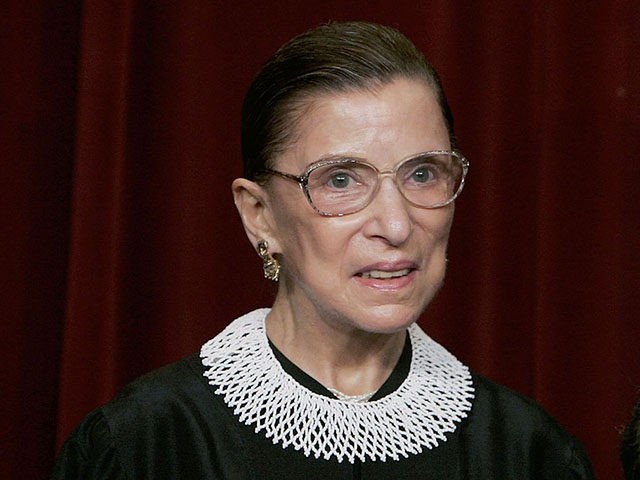Supreme Court Justice Ruth Bader Ginsburg, the high court’s most senior liberal justice, has died due to complications from metastatic pancreatic cancer at the age of 87-years-old, the Supreme Court announced Friday evening.
The Supreme Court spokesperson issued the following statement:
Associate Justice Ruth Bader Ginsburg died this evening surrounded by her family at her home in Washington, D.C., due to complications of metastatic pancreas cancer. She was 87 years old. Justice Ginsburg was appointed to the Supreme Court by President Clinton in 1993.
She was the second woman appointed to the Court and served more than 27 years. She is survived by her two children: Jane Carol Ginsburg (George Spera) and James Steven Ginsburg (Patrice Michaels), four grandchildren: Paul Spera (Francesca Toich), Clara Spera (Rory Boyd), Miranda Ginsburg, Abigail Ginsburg, two step-grandchildren: Harjinder Bedi, Satinder Bedi, and one great- grandchild: Lucrezia Spera. Her husband, Martin David Ginsburg, died in 2010.
Chief Justice John G. Roberts, Jr. said of Justice Ginsburg: “Our Nation has lost a jurist of historic stature. We at the Supreme Court have lost a cherished colleague. Today we mourn, but with confidence that future generations will remember Ruth Bader Ginsburg as we knew her — a tireless and resolute champion of justice.”
Justice Ginsburg was born in Brooklyn, New York, March 15, 1933. She married Martin D. Ginsburg in 1954. She received her B.A. from Cornell University, attended Harvard Law School, and received her LL.B. from Columbia Law School. She served as a law clerk to the Honorable Edmund L. Palmieri, Judge of the United States District Court for the Southern District of New York, from 1959–1961.
From 1961–1963, she was a research associate and then associate director of the Columbia Law School Project on International Procedure. She was a Professor of Law at Rutgers University School of Law from 1963–1972, and Columbia Law School from 1972–1980, and a fellow at the Center for Advanced Study in the Behavioral Sciences in Stanford, California from 1977–1978. In 1971, she was instrumental in launching the Women’s Rights Project of the American Civil Liberties Union, and served as the ACLU’s General Counsel from 1973–1980, and on the National Board of Directors from 1974–1980. She was appointed a Judge of the United States Court of Appeals for the District of Columbia Circuit in 1980. During her more than 40 years as a Judge and a Justice, she was served by 159 law clerks. While on the Court, the Justice authored My Own Words (2016), a compilation of her speeches.
Days before her passing, Ginsburg dictated the following statement to her granddaughter, Clara Spera: “My most fervent wish is that I will not be replaced until a new president is installed,” according to NPR.
Ginsburg, who has suffered from multiple health issues in recent years, was admitted to the hospital in July for a “minimally invasive non-surgical procedure” to “revise a bile duct stent” that was originally placed in August 2019. In May, Ginsburg was hospitalized with an infection caused by a gallstone and underwent non-surgical treatment for acute cholecystitis. Days later, the justice participated in the high court’s telephone arguments.
Ginsburg had twice been diagnosed with pancreatic cancer and also had lung surgery in December 2018 to remove cancerous growths. She underwent surgery for colorectal cancer in 1999.
Ginsburg had been on the court since 1993, appointed by President Bill Clinton. Only Justice Clarence Thomas had served longer among the current members of the court.
White House Chief of Staff Mark Meadows mourned Ginsburg’s passing, saying that the justice was “a trailblazer, a dedicated public servant, and an inspiration to so many.”
“My prayers are with her family and friends,” he added.
In August, President Donald Trump pledged to fill a Supreme Court vacancy if one opened up in 2020, despite it being an election year.
“Absolutely, I’d do it,” Trump said in an interview with radio host Hugh Hewitt who asked him about the Supreme Court.
Shortly after Ginsburg’s death, ABC News’ John Santucci reported that President Donald Trump is expected to put forth a nominee to fill the now-vacant court seat “in the coming days,” according to multiple sources with direct knowledge. The White House has yet to comment on the report.
Senate Majority Leader Mitch McConnell (R-KY) praised Ginsburg as someone who lead an “extraordinary American life” and said that the “President Trump’s nominee will receive a vote on the floor of the United States Senate.”

COMMENTS
Please let us know if you're having issues with commenting.